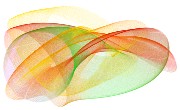
GlobalAnalysis ofInvariantObjects
|
 |
GAIO is an experimental software for the numerical investigation of dynamical systems. It provides methods for
- the setwise approximation of invariant sets like (relative) global attractors, invariant manifolds of (in principle) arbitrary dimension [1,2];
- the approximation of natural invariant measures [3,4].
- the approximation of cyclic behavior and identification of "almost invariant sets" [4,5].
GAIO implements data structures and corresponding algorithms that allow for a numerical analysis of dynamical systems on a global level. The methods build upon a multilevel approach to the computation and storage of coverings of the objects being approximated. Typical objects include invariant sets like (global) attractors, chain recurrent sets, the maximal invariant set and invariant manifolds. On top of the computation of these topological structures a global statistical analysis of the system may be performed. To this end the computed covering is used in order to discretize a suitable transfer operator of the system. Spectral properties of the resulting finite-state Markov chain reveal statistical information like invariant measures and almost invariant sets.
GAIO is coded in C,C++ and Fortran and features interfaces to Numerical Python and MATLAB.
| Keywords | Other |
| Model | |
| Software Type | |
| Language | |
| Platform | |
| Availability | |
| Contact Person | |
| References to Papers |
- Michael Dellnitz and Andreas Hohmann
"A subdivision algorithm for the computation of unstable manifolds and global attractors"
Num. Math. 75 : 293-317, 1997.
- Michael Dellnitz and Andreas Hohmann
"The computation of unstable manifolds using subdivision and continuation"
in H.W. Broer, S.A. van Gils, I. Hoveijn, and F. Takens (eds.) Nonlinear Dynamical Systems and Chaos, PNLDE 19: 449-459, Birkhäuser Verlag, Basel / Switzerland, 1996.
- Michael Dellnitz, Andreas Hohmann, Oliver Junge, and Martin Rumpf
Exploring invariant sets and invariant measures
CHAOS 7(2) : 221-228, 1997.
- Michael Dellnitz and Oliver Junge
On the approximation of complicated dynamical behavior
SIAM Journal on Numerical Analysis 36(2) : 491-515, 1999.
- Michael Dellnitz and Oliver Junge
Almost invariant sets in Chua's circuit
Int. J. Bifurcation & Chaos 7(11) : 2475-2485, 1997.
- Michael Dellnitz, Gary Froyland and Oliver Junge
The algorithms behind GAIO -- Set oriented numerical methods for dynamical systems
in B. Fiedler (ed.) Ergodic Theory, Analysis, and Efficient Simulation of Dynamical Systems, pp. 145-174, Springer-Verlag, 2001.
- Michael Dellnitz and Oliver Junge
Set oriented numerical methods for dynamical systems
in B. Fiedler, G. Iooss and N. Kopell (eds.) Handbook of Dynamical Systems II: Towards Applications, pp.221-264, World Scientific, 2002.
|